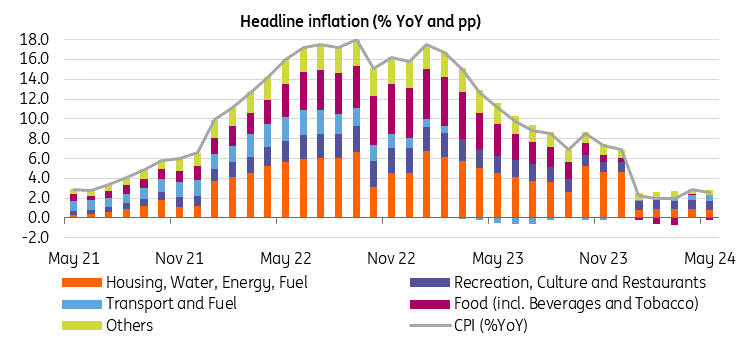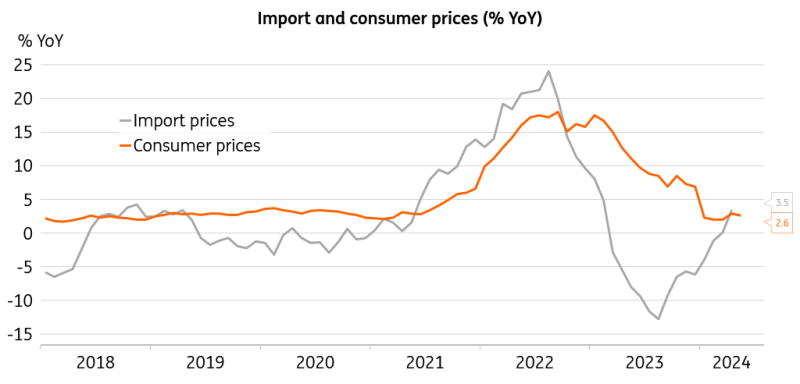Czech Inflation Remains In Check With Monetary Easing Set To Continue
The overall level of Czech consumer prices remained unchanged in May compared to the previous month, bringing the annual rate to 2.6%. The favourable reading suggests continued easing of the restrictive monetary policy setup.
Housing and services prices propel overall inflation
Consumer prices increased by 2.6% in May in annual terms, which is 0.3ppt below the April figure and softer than market expectations. Prices of goods rose by a moderate 0.9% in aggregate, while prices of services added 5.3% from a year earlier, adding to the concerns of policymakers.
The largest impact on overall annual inflation came from price increases in the housing section, with a 7.2% rise in rents and a 10.9% increase in water charges. Significant price rises were also observed in food services and accommodation services, increasing by 7.5% year-on-year and 10.2% YoY, respectively. In contrast, prices in food and non-alcoholic beverages shed 3.7%, representing the most prominent negative contributor to consumer inflation.
Inflation data brings some relief to CNB
(Click on image to enlarge)

CZSO, Macrobond
Core inflation came in at 2.5% YoY and 0.1% MoM in May, with the annual figure being softer compared to the previous reading. The deceleration in both overall price growth and core inflation is a welcome relief for the Czech National Bank policymakers, with the monetary easing mode most likely to carry on. The disinflationary process remains intact. Still, the high price dynamics in the service sector suggest some caution is needed, contributing to a likely slowdown in the pace of the policy rate cuts. The CNB’s spring forecast assumes the overall consumer inflation to reach 2.4% this quarter, which is below the current two-month average of 2.8%. The recent CPI reading is in line with our forecast of a 2.5% whole-year average.
No smoke without fire, no growth without price pressures
A stronger Czech koruna exchange rate and lower Brent crude prices in May have helped to keep consumer inflation in check. Meanwhile, overall import prices accelerated in April, with some price pressures remaining in the pipeline to reach consumers in the coming months. Turning to wage inflation, the average monthly nominal wage added 7.0% from a year earlier in the first quarter, increasing by a solid 4.8% YoY in real terms. The less stressed household budgets will add to a pickup in consumer demand, corresponding with a reported sound pass-through of production costs along the supply chain as reported in the PMI survey. Overall, we see the demand-driven economic rebound as pro-inflationary in the near term, with lagging investment and a limited workforce keeping supply from holding pace with buoyant demand growth.
Import prices heat up
(Click on image to enlarge)

CZSO, Macrobond
The Czech unemployment rate decreased to 3.6% in May, according to the Labour Office. The continued tightness in the Czech labour market sets the stage for further upbeat growth in nominal and real wage dynamics throughout the year. This, in turn, implies a solid outlook for household spending, contributing to a build-up of price pressures in the coming months and quarters. The upbeat wage growth and persistent tightness of the labour market will surely represent a key topic for the CNB with respect to the future path of monetary easing. We expect policymakers to reduce the rate by 25bp to 5% at this month’s meeting. It will likely descend to 4.5% at the end of this year with 3.75% being the terminal rate for 2025.
More By This Author:
Markets Underpricing Summer UK Rate Cut As Jobs Market CoolsFX Daily: The Euro Faces A Long June
The Commodities Feed: Brent Back Above $80
Disclaimer: This publication has been prepared by the Economic and Financial Analysis Division of ING Bank N.V. (“ING”) solely for information purposes without regard to any ...
more


